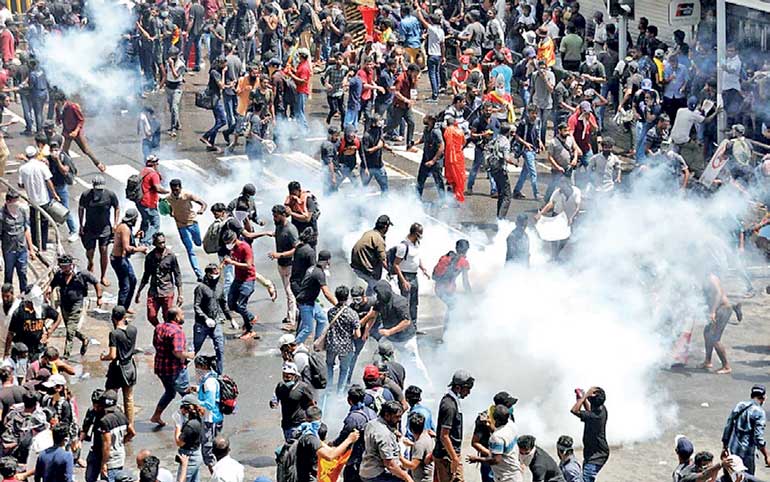Sunday Feb 22, 2026
Sunday Feb 22, 2026
Tuesday, 2 August 2022 03:30 - - {{hitsCtrl.values.hits}}

‘IDPs’ – internally-displaced protestors
 Much ink has been spilled over the people’s struggle movement (‘Aragalaya’) that has brought popular sovereignty to the fore like never before perhaps. Most of it has focussed on political personages, legal loopholes and parliamentary or constitutional wrangling, and the role of law/law enforcement/the military.
Much ink has been spilled over the people’s struggle movement (‘Aragalaya’) that has brought popular sovereignty to the fore like never before perhaps. Most of it has focussed on political personages, legal loopholes and parliamentary or constitutional wrangling, and the role of law/law enforcement/the military.
But in my book, precious little investigation has been exercised into the psyche of the nation per se. And I suspect that if you scratch beneath the surface of the ‘struggle’s’ form, and take a little more trouble to dig deeper into the function of what has transpired since the storming of the presidential palace and more, you’d find a few fundamentals about our island’s destiny that are worth unearthing.
Ironies
For one, a delicious sense of irony has escaped the tastes of our principal political players.
On the one hand, a once popular ‘technocrat’ who was virtually deified as the salvific messiah promised in the holy writ, or some soothsayer’s tea-leaf readings, ended his career as the most vilified chief executive in our country’s chequered presidential history.
To add injury to insult, this formerly god-like figure who was feared by all and sundry had to flee in haste and ignominy the nation-state he supposedly ‘saved’ to save himself.
That his return to the isle – to indifferently enjoy the fruits of privileged retirement, it is rumoured? – is a dilemma to those who opposed his regime.
The crackdown on certain selective elements of the people’s liberation movement to safeguard the remnant of the regime and assure politicos their sorry hides are safe underscores a dilemma for dynamic democracy. That popular sovereignty in general and the liberty of some of its leaders in particular – identified and targeted – is in peril.
On the other, another much derided technocrat (no ‘inverted commas’ are needed for him; for unlike his executive predecessor, he knows his chemical onions from other organic variants) has parachuted into the top slot of the popularity stakes amongst his erstwhile political enemies.
It has placed the Pohottuwa on the horns of dilemma, for sure. And it would be no little irony if Ranil Wickremesinghe now dismantles the SLPP from outside-in as he then did the UNP from inside-out.
This has placed the nation also in no small dilemma. Because the ‘parliamentary election’ was legal and constitutional enough – even if rumours of horses being bought were much bandied about social media (when the dilemma in people’s minds is when the older nags would be put down, not put up for office!).
The peril if we ignore legitimacy in favour of stability ahead of an increasingly forlorn IMF bailout is not clear to everyone – especially the ‘Colombo liberals’ who are growing anxious about the Aragalaya’s ‘red’ roots.
It’s certainly a dilemma for lovers of peaceful protest because there’s more than a suspicion these days – especially after not so spurious claims by the agents provocateurs themselves – that the Aragalaya was hijacked, subverted, whatever...
No little irony in the ‘man with no mandate’ going on to secure the plum job of state on the back of that kidnapping or abduction, meanwhile – albeit after failing to practise what he preached for 45 years, and driving the last nail into the coffin of Sri Lanka’s ‘grand old party’.
Dilemmas
These two role reversals – a tale of two unprecedented presidents – underline a raft of fundamental truths that could or should inform the present disposition of those still seeking a ‘deliverer’ to unshackle an entire nation from the bondage of bankruptcy.
It’s ironic how our recent dalliance with Singapore-style ‘messiahs’ and the miserable failure of that project – to the point of national penury that has never been experienced by any generation of our islanders before – has not quite taught us to steer clear of so-called ‘saviours’. We continue to be gulled by this romantic but demonstrably untenable notion of ‘the best man for the job’. Often, we self-deceivingly overlook the possibility that he is/they are perhaps the worst at that... at all our peril! The dilemma is that there is no such animal, mineral or vegetable.
It would be ironic if we foolishly persevered in courting such charlatans.
It is much like walking about clutching a candle in broad daylight looking for an honest politician.
It is at our peril that we abandon the pillars of policy and principle, rather than investing all our means and money in a next generation of disciplined, efficient, clean policymakers.
It is still a dilemma that our civic struggle isn’t more clearly oriented towards elected representatives who can work as a team in the national interest. Rather than treating country enterprises as a personal or familial project under the pretext of ‘politics is the art of the possible’.
There is a tide in the affairs of politically minded men and propaganda movements, which, taken at the flood, can lead to personal fortune and national misfortune alike.
And no one – not even an estimated million people ‘voting with their feet’ as the representative mass of citizens did on behalf of their fellow islanders that fateful day – can dam it. And yet, we can damn ourselves by failing to articulate a reformed, refreshed and revitalised avatar of the Aragalaya. Not riled by rabble-rousers in the House or on the streets who would have their anachronistic revolution even at the costs of anarchy. But restrained by respect for the law and due process. And realising that even in the face of seeming defeat, the electorate will not countenance a consolidation of the gerontocratic, entrenched, militarised, old political culture come the next general election.
More tellingly, there is our very failure to distinguish between one ‘peaceful protestor’ and another ‘rabid revolutionary’ catapulting into the highest office of the land a man whose monumental ambitions remain blind to the same reality (or is it a violent form of denial, this cracking down on the very folks who drove him into the hot-seat?). That dissent has no political party and dissidents from across the socioeconomic spectrum can unite – if not in principle, then out of desperation.
Of course, one must sound a caveat to those who would remain naive and sentimental about the grim faces of intrigue behind the ideological side of the Aragalaya.
Our refusal to learn the lessons of successive spectacular failures in the presidential aegis for over 44 years is an irony that has ended up as egg on all our faces – and yet, we’re scrambling to make an omelette out of whom or what are plainly more bad eggs...
Perils
The irony of the ‘man with no mandate’ but the endorsement of a political machine that has dominated the polity for nearly two decades brings with it a set of dilemmas for a torn electorate.
For one, is it helpful in hindsight to distinguish between ‘our’ Aragalaya driven by peaceful, innocent sea-green republicans with nothing but the national interest at heart; and ‘their’ Aragalaya infiltrating a legitimate citizen’s movement?
Was the game afoot early enough for the citizen uprising to be nothing more than a Trojan horse?
Or did savvy observers only wise-up midstream, when the moment seemed opportune to wreak havoc and eke vengeance by torching state property?
Or did ‘civil society’ – now baulking at the prospect of being an unwitting proxy for the JVP-led FSP and IUSF, leveraging on the cusp of a popular victory to bolster their own image and prospects – fear such subversion too late?
Is this not wrongly assuming that protestors’ motives were purer than purely political ones? When, in fact, a majority of those who took to the streets did so out of economic hardship – after having tolerated social injustice and political chicanery when the dominant narrative that harmed so many segments of their fellow citizens was ignored for so long?
Also, is it not falsely arrogating to every politically tinged player in the ‘Occupy Galle Face’ movement such as the IUSF the putatively darker agendas of shadowy players such as the FSP?
Last not least, is it unfairly and ungratefully dismissive of a complex, heterogeneous wave of humanity that achieved the unthinkable – ousting an entrenched chief executive using the impetus of popular sovereignty? When years of parliamentary oneupmanship and where waves of politically motivated marches on the capital to evict a weak president presiding over a failed state had not accomplished the same objective?
For another, the lack of a popular mandate begs the legitimacy of the constitutional imperative that propelled the incumbent into the office he has long aimed for but been denied for a plethora of reasons ranging from apathy to his policies to a lack of simpatico with the people and the vagaries of electoral alignments.
But now that he is in situ, and legally if not necessarily legitimately at that, what are we to do with him?
On the one hand, there are those who would argue that he – with his expertise and whatnot –is ‘the best man for the job’. This reeks of hypocrisy and self-serving motivations, as the ‘let’s give him a chance’ brigade has changed their minds at the abruptness of his demeanour even post election; declaration of a spurious emergency; and ongoing dalliance with a regime and its royalty-like cabals that brought rack and ruin upon the nation.
In addition, they seem willing to overlook his fascism – which looks far more fascistic than the strange reticence of the military mandarin when he was under siege only recently – in the interests of rescuing the economy.
On the other, many tend to miss the bigger picture of the road to rescue by too many pit-stops along their own Via Dolorosas, carrying crosses which it may be better to put down for the nonce? This too, is a national dilemma.
Would a temporary and willing suspension of the demand for justice of all ilks to be served be beneficial to the ‘Save Sri Lanka’ mission in the short to medium terms? Of course, many have waited long and patiently – in an often enforced silence. And with no recourse in the socio-political ‘north’ then, as in its ‘south’ now – sans hope... Must they be denied now, even when (especially when) in an island ‘on the move’ (ironically enough, inching along in never-ending queues) they’re united in an unprecedentedly comradely citizenship?
Therefore, let us articulate a reformed, refreshed and revitalised avatar of the Aragalaya.
Reformed by returning to its organic peaceful roots, although the dilemma of political instability that may compromise an IMF bailout remains writ large.
Refreshed by voluntarily dissociation from political agendas and violent activists, ironic though this may be – because it was ‘they’ who gave ‘us’ one victory and may deny ‘us’ another.
Revitalised by a return to silent protests at the ongoing political circus, lest the peril of not standing with the oppressed now makes us complicit first, and then renders us too victims.
| Editor-at-large of LMD |